
Published 14th Jul. 2022
Reading time
According to mythology, many of Greece’s islands were crafted by the gods, and these creation myths appear apt given the islands’ exceptional beauty and other-worldly qualities. Estimates for the number of Greek islands and islets dotted along the expansive coastline vary between 1,200 and 6,000, of which 227 are inhabited, leaving you with plenty of options when planning a holiday in Greece. You can’t really go wrong with any of the Greek islands – each possesses its own individual charm and a scattering of stunning beaches – but if you’re struggling with where to start, read on for our list of the most beautiful islands in Greece.
Santorini is somewhat of a cliché choice to kick-off the list, but there are a multitude of reasons why the film-set stunning island is considered one of the most beautiful islands in Greece. Whitewashed villages are carved into the cliffsides, with sugar-cube houses tumbling towards the turquoise ocean. Oia’s azure-roofed buildings are instantly recognisable, and the village’s striking sunsets provide prime photo opportunities. The south of the island does offer some respite from the hoards of Instagrammers, however, and is worth visiting for the multi-coloured sand beaches.
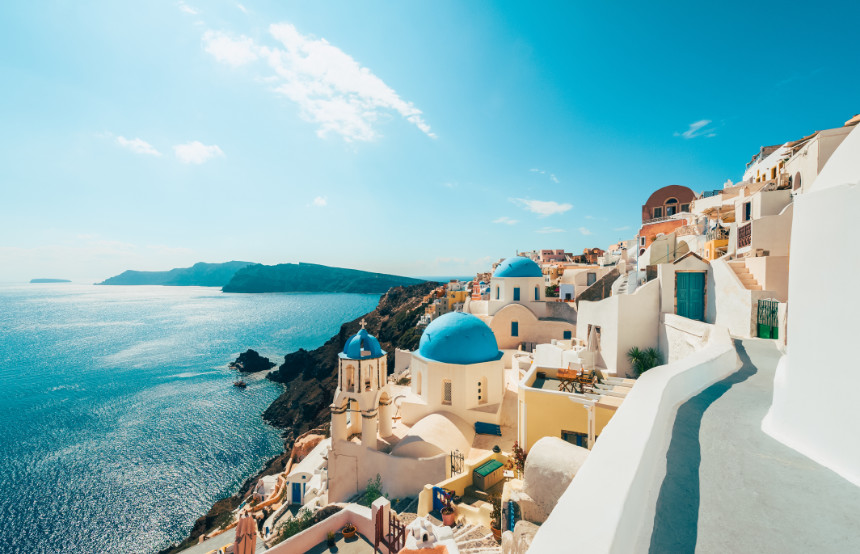
Getty Images
Next up is Naxos, the largest island in the Cyclades archipelago, renowned for its string of powder-sand beaches which adorn the west coast. The interior is dotted with dozens of dozy towns and villages, where you’ll find lots of local produce – including arseniko cheese – and well-established distilleries, serving kitron (citron liqueur). Naxos Town is imbued with Venetian influences, a nod to its previous Venetian rule, while Mount Zeus (supposedly where Zeus spent his childhood) is laced with well-worn hiking trails.
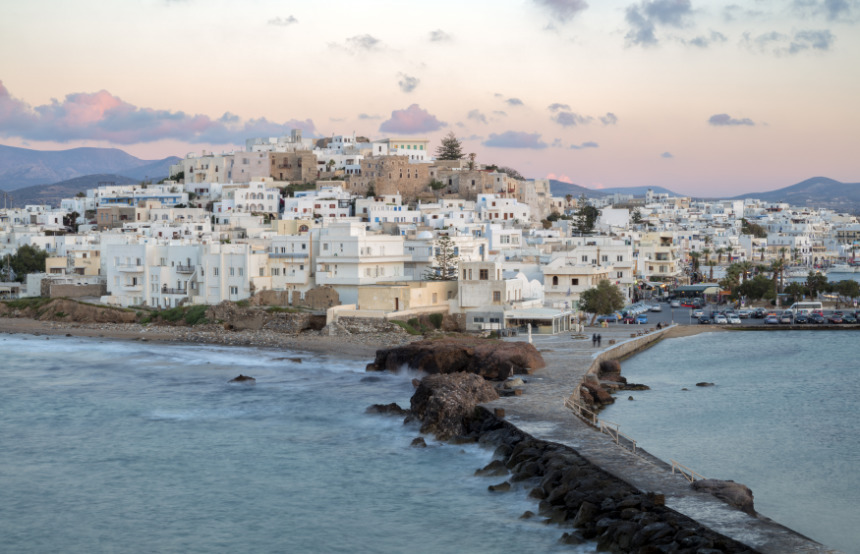
Getty Images
Another well-established addition to the list, Corfu is the centrepiece of the Ionian islands. Although the south tends to cater to party-goers, the rest of the island is as enchanting as ever and still resembles the idyll described in the writings of Gerald and Lawrence Durrell. Byzantine architectural masterpieces are found perched upon lush clifftops, such as Angelokastro and Kassiopi Castles, while the pastel villages are reminiscent of those found in the Tuscan countryside. And to top it off, Paleokastritsa beach is heralded as one of Greece’s best beaches.
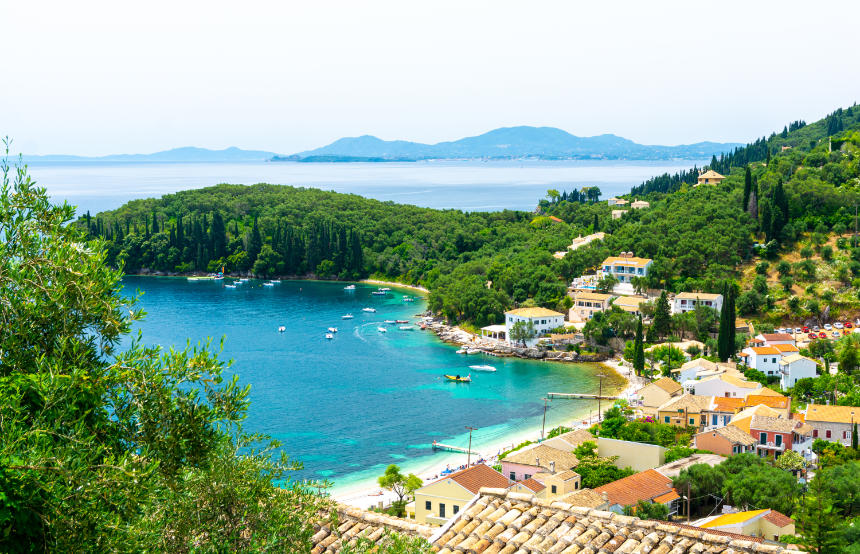
Getty Images
Ever since local chef Nicholas Tselementes created the original Greek recipe book here in 1910, Sifnos has been crowned the undisputed gastronomic capital of the Greek islands. Some of the best local dishes include traditional revithia (chickpea stew) and mastello (lamb with red wine and dill), as well as Sifnian melopita (honey pie) for those with a sweet tooth. Aside from its culinary proficiency, the island promotes a peaceful rhythm of life and encourages easy-going days. Intersperse indulgent feasts with visits to the famed pottery workshops and buttery-sand beaches in the southeast.
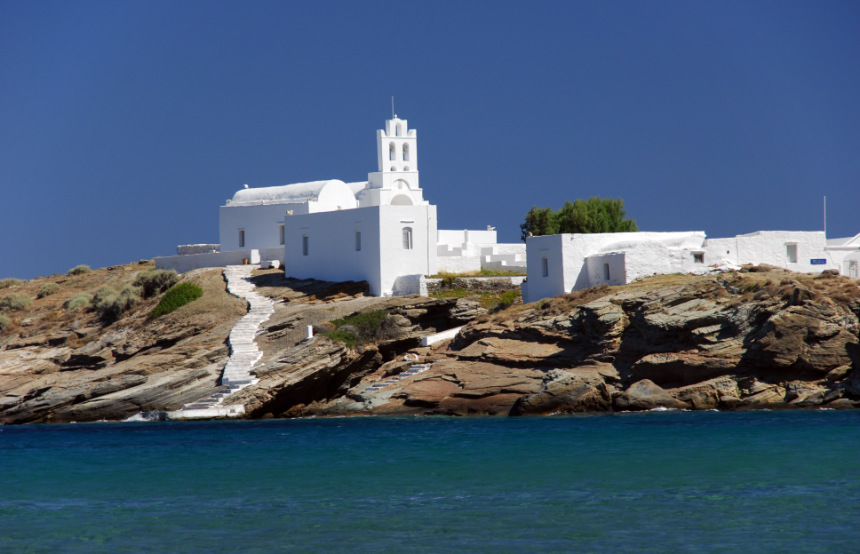
Getty Images
Mykonos is an obvious addition to our list of the most beautiful islands in Greece, and a worthy contender for Greece’s hedonistic headquarters (the island has been nicknamed the Ibiza of the Aegean). Its capital, Hora, is often touted as one of the most beautiful Greek towns, thanks to its trademark windmills and bougainvillea-draped buildings. The island has become somewhat of a hotspot, with influxes of Instagrammers and ravers, yet it is still possible to find some away-from-it-all corners such as the beaches of Lia and Agrari.
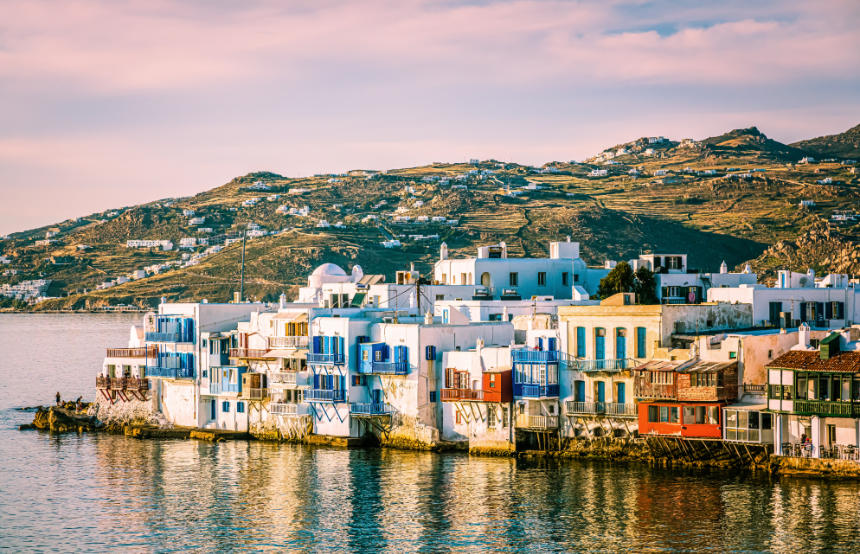
Getty Images
Despite its pocket-sized proportions, Hydra certainly packs a punch when it comes to beauty and its proximity to Athens makes it a popular weekend destination for the city’s smart set. The island is car-free, with mules and donkeys providing the main form of transport which only adds to the relaxed atmosphere, and the most active thing about it is its thriving art scene. The surrounding sea is impossibly clear and what the island lacks in terms of sandy beaches, it makes up for with secluded coves and charming crevices.
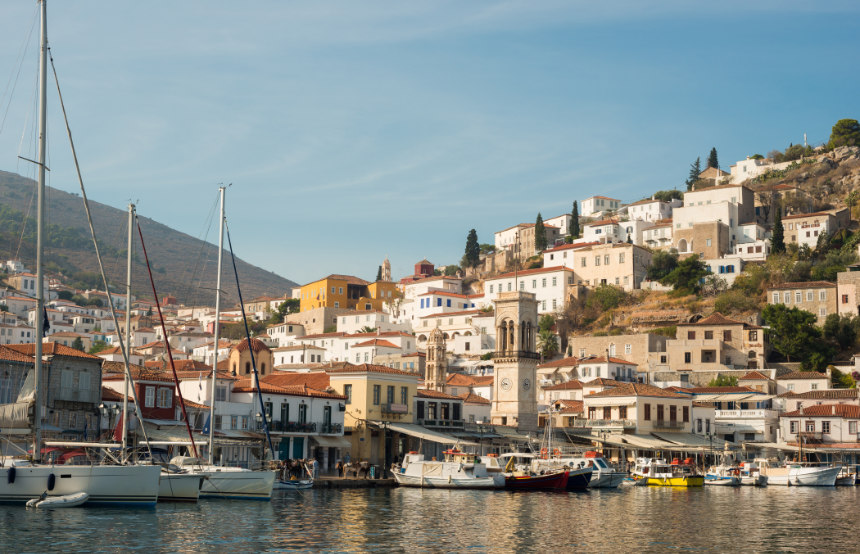
Getty Images
Often likened to a less glitzy Mykonos, egg-shaped Paros is pockmarked with pretty villages and encased by golden beaches. Its nightlife is lively, and it has all the classic Greek features (quaint villages, sugar-white structures and historic monasteries), but the lack of tourist crowds on the island as a whole only increases its appeal. In ancient times, Paros was treasured for its marble quarries and Parian marble formed the basis for the temples of Zeus and Apollo, as well as the Acropolis.
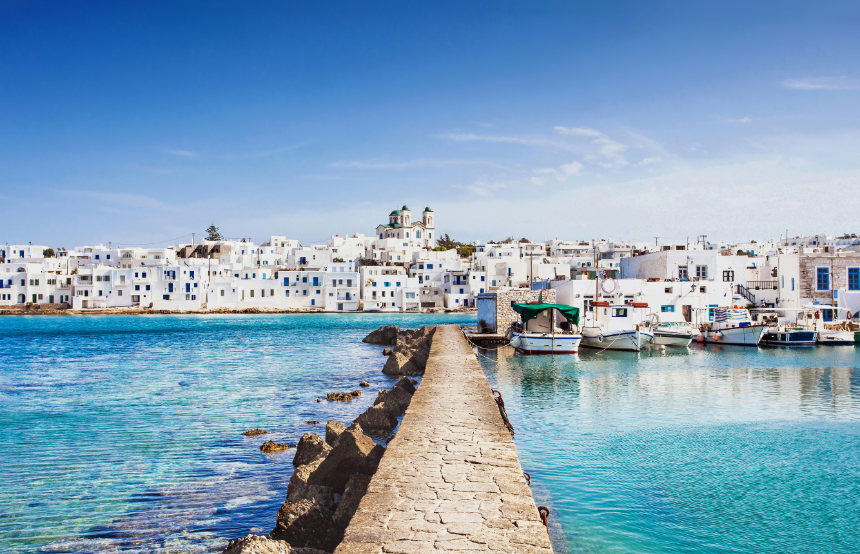
Getty Images
Milos, the volcanic island in the west of the Cyclades, remained relatively undiscovered until recent years. Home to over 70 beaches, this is the ultimate Greek island for a beach-lounging, sun-tanning holiday and its volcanic geography means that it’s blessed with a number of natural hot springs, which you can wallow in for free. Although you may not have heard of the clandestine island, there’s no doubt you’ll know its most famous export: the Venus de Milo, which now stands proud in the Louvre.
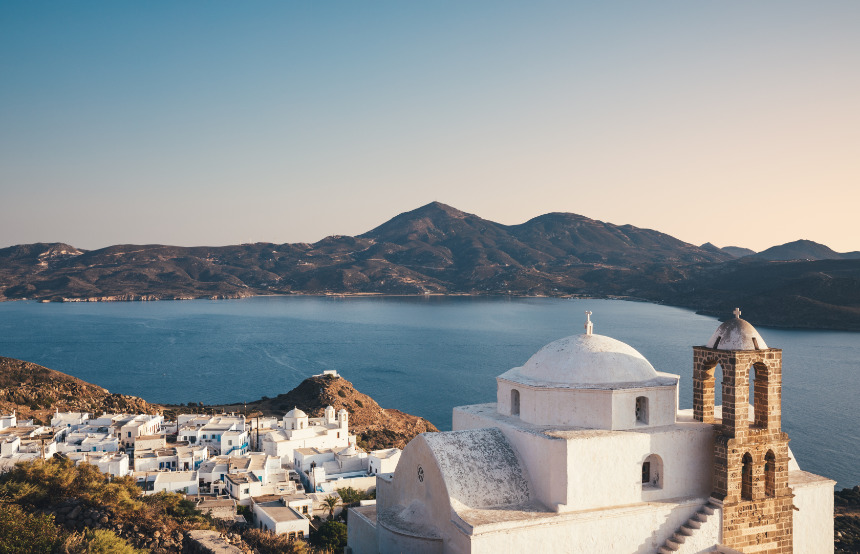
Getty Images
The largest and most populous of the Greek islands (as well as Zeus’ birthplace according to Greek mythology), Crete scarcely needs much introduction. Parts of the island have unfortunately become overrun with over-development, yet there are still plenty of authentic places to explore where the local food is exceptionally fresh and the olive groves remain untouched, such as the Amari valley and the hamlet of Milia. Hike Samaria Gorge, one of Europe’s longest, picnic on the pink sand of Elafonisi island and sample delicacies from Chania’s bustling market.
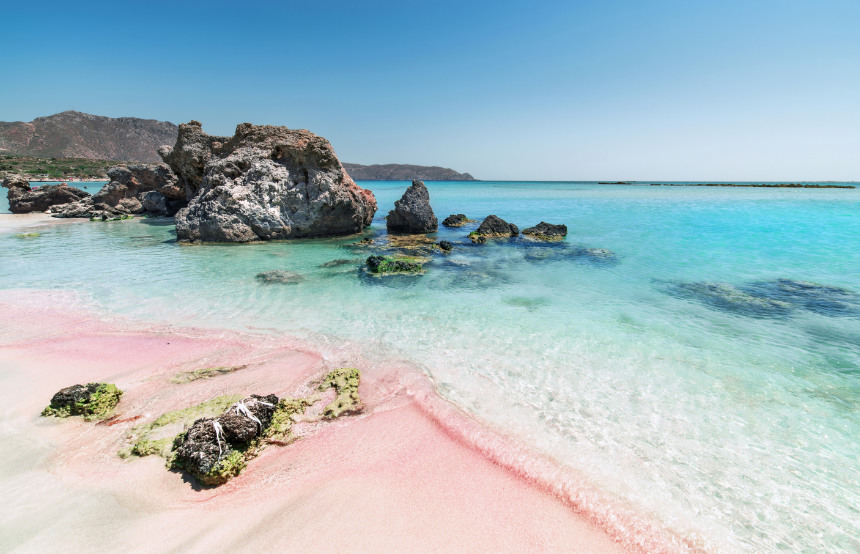
Getty Images
Concluding our list of the most beautiful islands in Greece is tucked-away Amorgos, whose far-flung location on the eastern edge of the Cyclades makes it a hidden gem of a destination. The rugged interior entices walkers and hiking the mountainous topography is the only way to access many of its beaches, meaning there’s every chance you’ll have one all to yourself. Blonde sand is lapped at by startingly clear waters, which attract avid divers, and the under-the-radar vibe of the island is suitably summed up by Katapola harbour’s welcome sign, which reads ‘Welcome to Amorgos. Nobody will find you here.’
Written by Luisa Watts
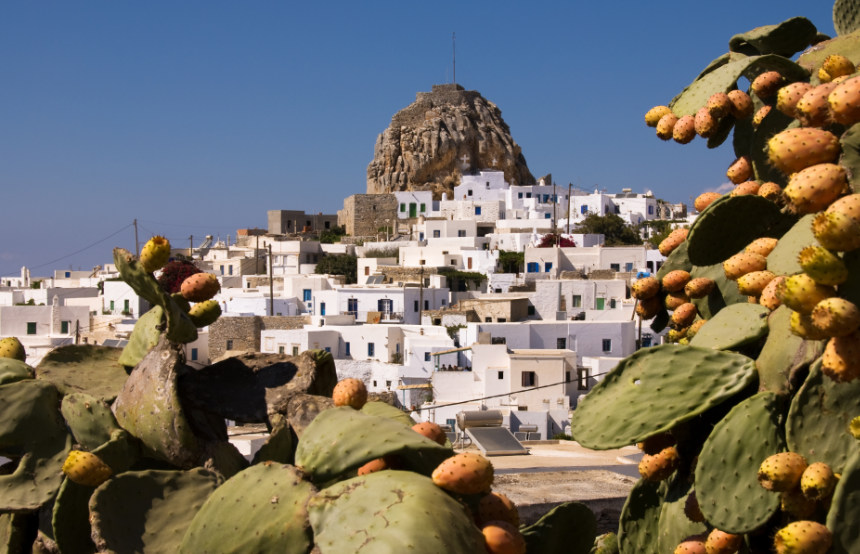
Getty Images

We have travelled all over mainland Greece and its island-studded ocean to seek out the best spots, allowing us to plan truly bespoke trips. Whether touring the Acropolis with an art historian or meeting seasoned ceramicists at a local workshop, we work with the best local guides to help you get under the skin of Greece. We know how to avoid the crowds and the heat (like only booking Olympia tickets after 4pm), while our clued-up Concierges are our eyes and ears on the ground, offering insider tips on the hottest tickets and newest openings. This means we can recommend hidden island hideaways before the masses find out about them...
ENQUIRE NOWPractical advice and inspiration for your next trip

When it comes to romance, Greece’s islands set the bar high. From Paros’ sun-kissed beaches and Folegandros’ blush-pink blooms to Sifnos’ culinary delights and Hydra’s slow-paced streets, each island radiates beauty. Whether you fall in love with the sunset in Santorini or the atmosphere in Apollonia, the perfect spot awaits. Read on to discover the most romantic islands in Greece... Paros Folegandros Sifnos Hydra Santorini Paros Best for:
27th October 2025 - Greece Travel Inspiration

On a recent research trip to the Peloponnese in Greece, our Europe specialist, Emily, self-drove around the region’s most photo-worthy spots. When she wasn’t basking in the sun on Elafonisos’s beaches or devouring Greek dishes at local tavernas, she was putting on her history hat and exploring the ancient archaeological sites of Mycenae and Epidaurus. From Arcadia’s muscular mountains to the velvety sands of the Mani Peninsula, it was an adventure to remember.
17th June 2025 - Greece Travel Tips

Often overlooked by holidaymakers seeking an authentic Greek experience, the Saronic Islands deserve their moment in the spotlight. Boasting the quintessential Greek combination of dazzling blue sea, skies and vivid green pine tree-covered hillsides, Spetses is one of the best-kept Saronic secrets (until now). Wealthy Greeks have been frequenting their villas on the idyllic isle for years, parking their superyachts offshore for the season; come September, the millionaires have left, and the island reverts to its charming normality.
8th June 2025 - Greece Travel Inspiration

Our team of destination experts will get to know you and your unique requirements for your holiday

We work with you to build an ultra-personalised holiday itinerary with your choice of accommodation, experiences and activities

All of our holidays include little extras designed to make a big difference to your trip, from fast-tracking you through airport check-in and security to our network of local Concierges